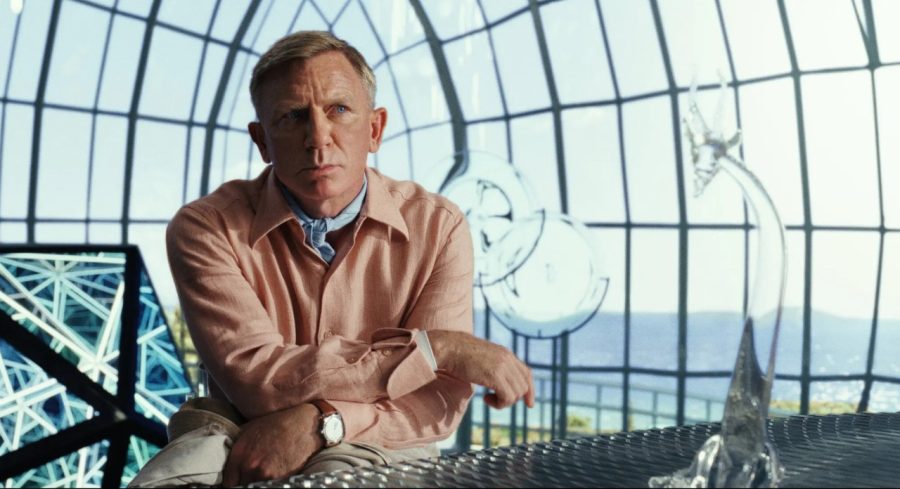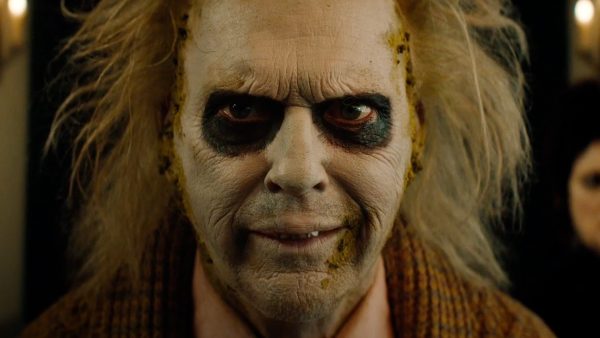‘Glass Onion’ is a disappointing mess
The ‘Knives Out’ sequel fails to live up to its predecessor
“Glass Onion: A Knives Out Mystery” is a feeble attempt to follow the triumph that was 2019’s “Knives Out.” Rian Johnson, director of “Star Wars: The Last Jedi” and “Looper,” directed both “Knives Out” and “Glass Onion,” though his work has faced a steady decline in quality. “Knives Out” was a masterpiece of acting, screenwriting, and cinematography. Johnson showcased his talents thoroughly and explicitly throughout its production, yet in “Glass Onion” his writing falls flat. One of the most frustrating tropes present in poorly written mystery novels occurs when the writer withholds information from the audience, and simply reveals it as the resolve to the mystery. Though Johnson was successful in his use of this trope in “Knives Out,” it only worked because of Marta’s (Ana de Armas) character. Marta recounted her experiences to Benoit Blanc in a way that allowed the audience to see the story unfold, without rendering the exposition pointless or letting the tension run slack. Unfortunately, in “Glass Onion,” that is exactly what happened.
The first hour of “Glass Onion” largely follows Benoit Blanc in his experiences on the island and with the other guests. It seems to the audience as if he had received an invitation like all the others and was meeting all of them for the first time. At about 60 minutes in, we find out that this is all false. In fact, Benoit Blanc knew about all the conflict between the friends, and had conspired with one of the guests to arrive on the island and investigate. Even though the audience had been following him as the main character, in the same way they followed Marta in “Knives Out,” this information had been withheld, and its reveal served as the big twist which climaxed the plot. This plot structure is characteristic of lazy writing and leaves viewers unsatisfied after the release of tension.
There was no mystery to unravel along the way, no way the audience could have deciphered along with Blanc; it was simply a flashback that showed them what actually occurred. Even amid all the plot failings, more contradictions appear. The napkin upon which Andi sketched her initial plan for the company Alpha, which Miles claimed to be his own work, is the sole piece of physical evidence that drives the plot. Even though it cannot be proven in court when the napkin was written on or by whom, the audience is expected to suspend their disbelief enough to allow the movie to conclude. Though it is necessary for the audience to suspend their disbelief in many well written movies, when the plot reaches territory that is simply too unrealistic, the story begins to come apart at the seams.
Edward Norton (Miles Bron), Janelle Monae (Andi and Helen Brand), and Madelyn Cline (Whiskey) offered outstanding performances in “Glass Onion,” considering the characters and script they were given. Janelle Monae had an especially difficult role in this film. Because she played both Andi and Helen, the Brand twins, and occasionally played both at the same time (Janelle, acting as Helen, who is in turn impersonating Andi), she would have to dive incredibly deep into her acting to match the characters yet show contrast through idiosyncratic behaviors and speech. Yet, the characters written for her were ultimately stereotypical and riddled with plot holes.
During the first hour of the movie, technically she played Helen, though it was Helen impersonating her sister Andi. Yet the way they explain Helen’s imperceptible impression of Andi was the fact that Andi was supposedly a relentless and thorough diary-writer. But this falls back to a previous inconsistency: the napkin. If Andi recorded all the events of her life in her journals, wouldn’t she have written her plans for Alpha down and the events and consequences of Miles’s subsequent betrayal? These inconsistencies in “Glass Onion” lead me to be continually confused and uninterested by its story.
Your donation will support the student journalists of Omaha Central High School. Your contribution will allow us to purchase equipment and cover our annual website hosting costs.

Hi! I’m Claire (she/her). This is my first year as a staff writer for The Register, but I’ve enjoyed writing for as long as I can remember. When I’m...

















